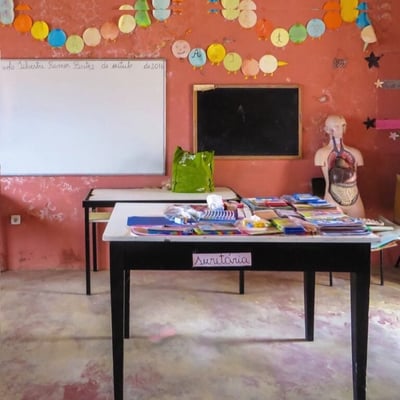1
00:00:03,215 –> 00:00:05,005
Irmão: Tens alguma coisa para me contar?
{{Brother: Do you have something to tell me?}}
2
00:00:05,623 –> 00:00:06,291
Irmã: Como assim?
{{Sister: What do you mean?}}
3
00:00:06,995 –> 00:00:09,934
Irmão: Não tens nada importante para me dizer?
{{Brother: You don’t have anything important to say to me?}}
4
00:00:10,646 –> 00:00:11,614
Irmã: Acho que não.
{{Sister: I don’t think so.}}
5
00:00:12,295 –> 00:00:15,942
Irmão: Ouvi dizer que recebeste uma proposta para trabalhar em Espanha.
{{Brother: I heard you received an offer to work in Spain.}}
6
00:00:16,579 –> 00:00:17,630
Irmã: Quem é que te disse?
{{Sister: Who told you?}}
7
00:00:18,277 –> 00:00:18,937
Irmão: O Xavier.
{{Brother: Xavier.}}
8
00:00:19,697 –> 00:00:27,718
Irmã: Eu pedi-lhe para não contar a ninguém. Queria reunir a família toda, para anunciar a todos ao mesmo tempo.
{{Sister: I asked him not to tell anyone. I wanted to get the whole family together, to announce it to everyone at the same time.}}
9
00:00:28,457 –> 00:00:31,061
Irmão: Não te chateies com ele. Ele não fez por mal.
{{Brother: Don’t get mad at him. He didn’t mean any harm.}}
10
00:00:31,690 –> 00:00:32,230
Irmã: Eu sei.
{{Sister: I know.}}
11
00:00:32,947 –> 00:00:36,116
Irmão: Nós estávamos a falar de ti, e ele descaiu-se.
{{Brother: We were talking about you and he let it slip.}}
12
00:00:36,876 –> 00:00:38,702
Irmã: Guardar segredos não é o forte dele.
{{Sister: Keeping secrets is not his forte.}}
13
00:00:39,405 –> 00:00:43,583
Irmão: Lá isso não é. Mas são excelentes notícias! Parabéns!
{{Brother: It isn’t. But it’s excellent news! Congratulations!}}
14
00:00:44,215 –> 00:00:46,551
Irmã: Obrigada. Estou muito entusiasmada!
{{Sister: Thank you. I’m very excited!}}
15
00:00:47,277 –> 00:00:50,065
Irmão: Mas conta-me lá isso melhor… como é que aconteceu?
{{Brother: But tell me more about it… how did it happen?}}
16
00:00:50,633 –> 00:00:52,433
Irmã: Eles entraram em contacto comigo.
{{Sister: They contacted me.}}
17
00:00:53,007 –> 00:00:58,399
Disseram-me que tinham visto o meu portfólio online e que queriam falar comigo por videochamada.
{{They told me that they had seen my portfolio online and wanted to talk to me by video call.}}
18
00:00:59,116 –> 00:01:01,548
Marcámos uma data e eles fizeram-me a proposta.
{{We set a date and they sent me the proposal.}}
19
00:01:02,213 –> 00:01:04,333
Irmão: E tu nem pensaste duas vezes!
{{Brother: And you didn’t even think twice!}}
20
00:01:05,091 –> 00:01:08,832
Irmã: Óbvio que não. Mas não aceitei logo, disse que tinha de pensar.
{{Sister: Of course not. But I didn’t take it right away, I said I had to think.}}
21
00:01:09,543 –> 00:01:10,324
Irmão: Fizeste bem.
{{Brother: You did well.}}
22
00:01:10,970 –> 00:01:12,698
Irmã: As condições são incríveis!
{{Sister: The conditions are incredible! (i.e. the terms of the contract)}}
23
00:01:13,261 –> 00:01:20,776
Irmão: Fico feliz por ti. E tenho a certeza que o resto da família também vai ficar. O avô vai ficar tão orgulhoso!
{{Brother: I’m happy for you. And I’m sure the rest of the family will be, too. Grandpa will be so proud!}}
24
00:01:21,372 –> 00:01:23,343
Irmã: Achas que devia falar com ele a sós?
{{Sister: Do you think I should talk to him alone?}}
25
00:01:24,054 –> 00:01:28,629
Irmão: Acho que sim, para dizer a verdade. A vossa relação sempre foi muito especial.
{{Brother: I think so, to tell you the truth. Your relationship has always been very special.}}
26
00:01:29,211 –> 00:01:31,454
Irmã: Tens razão. Ele vai gostar do gesto.
{{Sister: You’re right. He’ll like the gesture.}}
27
00:01:32,147 –> 00:01:37,203
Irmão: A mãe é que vai ter um desgosto… não vai aguentar ter a filha preferida tão longe de casa!
{{Brother: It’s mom who will be heartbroken… she can’t stand having her favourite daughter so far from home!}}
28
00:01:37,760 –> 00:01:39,098
Irmã: Não sejas idiota!
{{Sister: Don’t be an idiot!}}
29
00:01:39,559 –> 00:01:41,786
Irmão: Calma, não é preciso ofender…
{{Brother: Calm down, no need to offend…}}
 We respect your privacy and have a ZERO TOLERANCE for spam.
We respect your privacy and have a ZERO TOLERANCE for spam.
















This is driving me mad – what is Rui saying after Joel says ‘Practice Portuguese’?!
Hi, Maggie. Funny you ask that on a Shorty about revealing secrets! Well, the mysterious saying is… “Ponto com”, i.e. “dot com”, from the website URL 🙂
Even though you have said what it is I still hear “Bom To Com” ….more listening practice needed for me I reckon ! 🙂
Ah! But it proves that I still have a loooong way to go before i can understand even the smallest amount of what is being said to me. But thank you!
I hear the same bom to com 🙂
Thank you -this has been bothering me too!
Great episode – but I have a couple of questions that I would appreciated some help to clarify.
“ele descaiu-se ” does this mean “he let it slip”? or he stumbled?
“A vossa relação sempre foi muito especial.” why is it ir in the preterite – I thought this was for completed actions, but this describes and on going relationship.
Sometimes it would be really helpful to have idiomatic phrases explained more in depth, if that would be possible. 🙂 thank you.
Olá! Yes, “ele descaiu-se” means “he let it slip”. As for “A vossa relação sempre foi muito especial”, the verb “ir” is in the past tense because it’s paired with the word “sempre”. The intention here is to say that their relationship has always been very special, which is not something that we could convey in the present tense 🙂
Thank you Joseph, its great to have your clarifications, I think I am still wondering why it wasn’t the imperfeito that expressed an on going relationship – I think I will have to keep working at it. Sempre seems to have a wealth of meanings and uses – perhaps it might come into a lesson at some stage?
One more thing I would like to thank you all specifically for the Shorties” section – it is a great way to learn and listen. As ever entertaining and informative. You all work together to make a great team.
You’re welcome! Your reasoning about the imperfect tense makes perfect sense in theory, but in practice, it’s not appropriate here after “sempre”.
Thank you very much for your kind words, by the way. And for the lesson suggestion – added to our list of potential future content 🙂